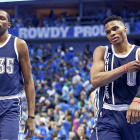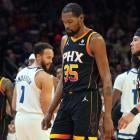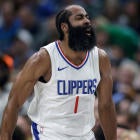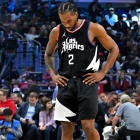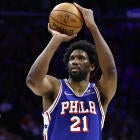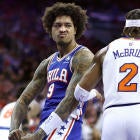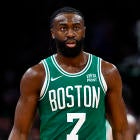Of all the questions regarding how Kevin Durant will fit with his new team, the Golden State Warriors, this is perhaps the most interesting: How will Durant adapt to playing next to Stephen Curry? This is the past two MVPs on the same team and two of the best and most efficient scorers in NBA history.
Trying to balance shots, touches and roles on one team for two players of that stature isn't easy. Curry reportedly told Durant he doesn't care about the star-power questions about shoe sales or being the face of the franchise. However, Curry will remain one of the Warriors' primary offensive threats, if not the main man. On the other side, Durant is willing to sacrifice statistics to make sure the Warriors are successful, but he also wants to be involved. He didn't go to Golden State to be a spot-up shooter.
So how will those two co-exist (we'll leave Draymond Green and Klay Thompson for later)?
The ironic, and particularly cruel part if you play for or are a fan of the Thunder, is that Durant is the one superstar best adapted to and prepared for such a role reduction because of the situation he left. Playing with Russell Westbrook for eight seasons prepared Durant better than anything for teaming up with Curry.
Westbrook is a lightning rod for criticism because of his aggressiveness and confidence. Essentially, he was always expected to be a set-up man for Durant, and his at-times reckless attack was perceived as a constant threat to OKC's efficiency. Westbrook never was Robin to Durant's Batman, he was his own superhero.
The reason that dynamic never blew up in a meaningful sense was because Durant was always OK with that. Durant would clap for the ball in certain situations, but he was always comfortable with deferring to Westbrook in late-game situations or for long stretches. Durant is an efficiency-minded, team-first player who isn't primed to demand touches or complain about statistics. While critics struggled with Westbrook taking over situations, it was rarely asked why Durant didn't demand an adjustment to that strategy, which the Thunder likely would have accommodated.
Durant became accustomed to that situation. He left Oklahoma City because he wanted a more free-flowing offense to take advantage of his talents. But unlike Dwyane Wade, who struggled to adapting to LeBron James in 2011, Durant has co-existed with another top-10 player in Westbrook.
While Westbrook and Curry need the ball, they differ greatly in style. Westbrook is a nuclear engine constantly headed downhill. Curry is the greatest shooter ever, and his game is based on skill and elegance. Durant's familiarity with playing next to a ball-dominant guard will help, but he'll be involved in Golden State's offense in a way he wasn't with Westbrook. Westbrook and Durant never complemented each other to the capacity they could have. While Westbrook is an underrated playmaker who improved in that regard, the duo took turns with the ball rather than working in concert. For the Warriors, Durant will act as a screener for Curry, who is a willing passer.

It should be noted that Westbrook assisted on 255 of Durant's buckets last season, 37 percent of his total made field goals. The guy really is a playmaker, it's just different from what Durant will have with Curry.
Durant arrives in Golden State as one of the league's best, ready to carry a team to an NBA title, just as he has been the past four years. But unlike many stars who land on super squads and have to make adjustments, Durant arrives ready to adapt his game to Curry's because he's already molded his game around another high-usage scoring machine.
The trick will of course be fitting into the system, how to combine his and Curry's interactions with Green and Thompson, and getting used to the idea of being a villain in the modern NBA after being beloved for so many years. But playing next to an elite superstar who needs the ball, shots and a big role in the offense will be easy for Durant.
He's been there for years. He just upgraded the support structure around him. Under those terms, Durant's decision makes a lot of sense.













